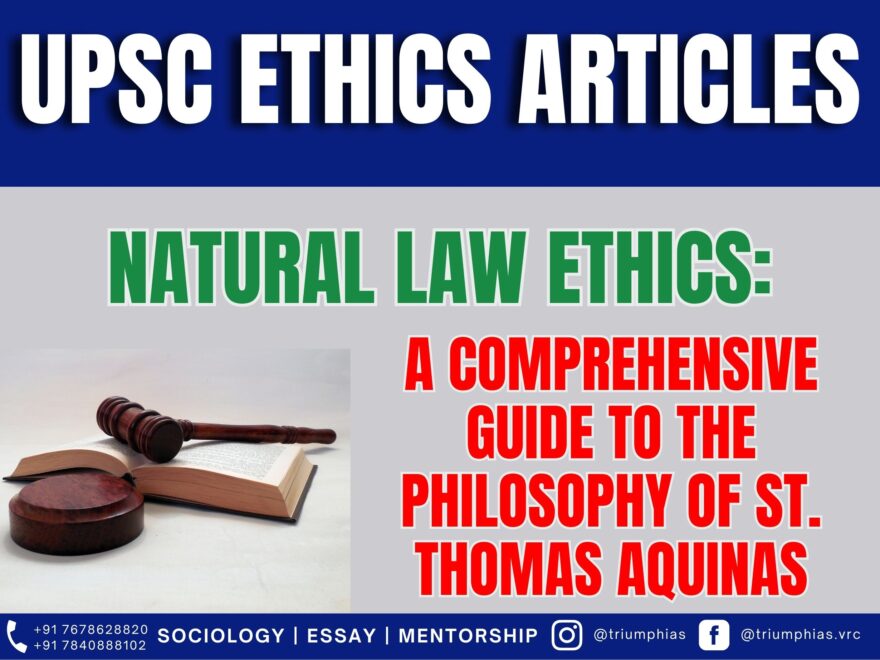Natural law ethics
(Relevant for Ethics, Integrity and Aptitude)

Natural law ethics
The comprehensive natural law philosophy was extensively formulated by the medieval thinker St. Thomas Aquinas. Aquinas posited that every natural entity possesses an inherent purpose or function.
To illustrate, the heart’s function is to circulate blood.
When natural entities fulfil their purposes, it leads to a beneficial state characterized by natural value. However, if natural entities are incapable of fulfilling their innate functions or attaining their natural purposes, it results in an unfavourable situation.
Natural Law Ethics promotes
- Identifying Inherent Values: Natural law theory recognizes natural values as encompassing what humans inherently desire and require, as well as anything that aligns with the cosmic order and its laws. It asserts that these natural values are morally commendable, and we bear a moral responsibility to promote them. Among these virtues, human reason holds particular significance and should serve as our guiding principle in all our endeavors.
- While natural law need not be linked to any particular religion, Aquinas introduced the idea that the entire cosmos is the creation of a benevolent and rational God. This concept serves to explain the intrinsic goodness of natural values and our ability to discern the structure of the natural world.
- Preservation of Life: All living entities share the natural value of preserving life. Although all living things ultimately face mortality, their constituent parts serve the purpose of sustaining life for as long as they are alive. Given that life is a natural value, endeavours to preserve it are commendable. The obligation to protect human life (and indeed all life) constitutes a fundamental aspect of natural law ethics, differentiating it from other ethical approaches.
- Promoting Social Harmony: As the preservation of the human species is intertwined with humanity’s natural function, individuals should engage in actions that enhance the proper functioning of the human race. Since human beings thrive within well-organized societies, morality dictates that we undertake actions that foster social order. Consequently, telling the truth, fulfilling promises, and engaging in activities that foster mutual trust become moral imperatives.
- Principle of Forfeiture and the Doctrine of Double Effects: Natural law ethics acknowledges that under certain circumstances, individuals may need to deprive others of their lives. For instance, if a deranged killer is on a violent spree, law enforcement may be justified in using lethal force. Such actions find justification in the principle of forfeiture, allowing for the protection of innocent lives.
Criticism
- Promoting natural purposes and functions may not always align with our best interests. Take, for instance, the female mosquito whose bite spreads malaria. Various efforts are made to eradicate mosquito breeding sites, which, from a natural law ethics standpoint, might appear to be in conflict with the principles of nature.
- Similarly, the removal of poisonous weeds presents another example. Nature encompasses various elements that are unattractive, such as the existence of predators and their prey within the animal kingdom. Killing and violence are inherent aspects of the natural world.
- According to Darwin’s theory of natural evolution, species undergo a struggle for existence, often leading to the elimination of weaker members. Consequently, natural processes may not necessarily yield morally acceptable principles.
- Another inherent issue with natural law theories lies in their selective interpretation of what constitutes “natural.” While it is true that all natural organisms eventually decay and perish, death is, indeed, a part of the natural order. However, this raises the question of whether we should actively promote or expedite death in certain circumstances.
- Natural law ethics typically oppose such a proposition. Many would argue that their stance is morally justified. However, this position may appear inconsistent with their overall approach of endorsing natural processes and functions.
What is interesting about natural law theory is that it includes both consequentiality and deontological components and so presents an alternative to both Kantianism and utilitarianism. Consequences, intentions, and moral principles all have roles in natural law theory.
Sample Question for UPSC Sociology Optional Paper:
Question 1: How does Natural Law Ethics promote social harmony?
Answer: Natural Law Ethics fosters social harmony by emphasizing moral imperatives like truth-telling, promise-keeping, and engaging in activities that build mutual trust, as these actions contribute to the well-organized functioning of human societies.
Question 2: What is the Principle of Forfeiture in Natural Law Ethics?
Answer: The Principle of Forfeiture in Natural Law Ethics allows for the deprivation of life in certain situations, such as when law enforcement must use lethal force to protect innocent lives from immediate harm.
Question 3: How does Natural Law Ethics reconcile with the concept of natural predators and violence in nature?
Answer: Natural Law Ethics faces criticism for its selective interpretation of what is “natural,” as it typically does not endorse natural processes that result in harm or death, like predation, despite these being part of the natural order.
Question 4: How does Natural Law Ethics differ from other ethical approaches like Kantianism and utilitarianism?
Answer: Natural Law Ethics incorporates both consequentiality and deontological components, offering a unique alternative to Kantian and utilitarian ethics by considering consequences, intentions, and moral principles in its ethical framework.
Question 5: What role does human reason play in Natural Law Ethics?
Answer: In Natural Law Ethics, human reason holds particular significance as the guiding principle in all endeavors. It helps individuals discern the structure of the natural world and understand the moral imperatives that arise from it.
Related Blogs …
To master these intricacies and fare well in the Sociology Optional Syllabus, aspiring sociologists might benefit from guidance by the Best Sociology Optional Teacher and participation in the Best Sociology Optional Coaching. These avenues provide comprehensive assistance, ensuring a solid understanding of sociology’s diverse methodologies and techniques.
Natural Law Ethics, St. Thomas Aquinas, Inherent Values, Life Preservation, Social Harmony, Principle of Forfeiture, Doctrine of Double Effects, Moral Imperatives, Criticism of Natural Law, Consequentiality, Deontological Components
Choose The Best Sociology Optional Teacher for IAS Preparation?
At the beginning of the journey for Civil Services Examination preparation, many students face a pivotal decision – selecting their optional subject. Questions such as “which optional subject is the best?” and “which optional subject is the most scoring?” frequently come to mind. Choosing the right optional subject, like choosing the best sociology optional teacher, is a subjective yet vital step that requires a thoughtful decision based on facts. A misstep in this crucial decision can indeed prove disastrous.
Ever since the exam pattern was revamped in 2013, the UPSC has eliminated the need for a second optional subject. Now, candidates have to choose only one optional subject for the UPSC Mains, which has two papers of 250 marks each. One of the compelling choices for many has been the sociology optional. However, it’s strongly advised to decide on your optional subject for mains well ahead of time to get sufficient time to complete the syllabus. After all, most students score similarly in General Studies Papers; it’s the score in the optional subject & essay that contributes significantly to the final selection.
“A sound strategy does not rely solely on the popular
Opinion of toppers or famous YouTubers cum teachers.”
It requires understanding one’s ability, interest, and the relevance of the subject, not just for the exam but also for life in general. Hence, when selecting the best sociology teacher, one must consider the usefulness of sociology optional coaching in General Studies, Essay, and Personality Test.
The choice of the optional subject should be based on objective criteria, such as the nature, scope, and size of the syllabus, uniformity and stability in the question pattern, relevance of the syllabic content in daily life in society, and the availability of study material and guidance. For example, choosing the best sociology optional coaching can ensure access to top-quality study materials and experienced teachers. Always remember, the approach of the UPSC optional subject differs from your academic studies of subjects. Therefore, before settling for sociology optional, you need to analyze the syllabus, previous years’ pattern, subject requirements (be it ideal, visionary, numerical, conceptual theoretical), and your comfort level with the subject.
This decision marks a critical point in your UPSC – CSE journey, potentially determining your success in a career in IAS/Civil Services. Therefore, it’s crucial to choose wisely, whether it’s the optional subject or the best sociology optional teacher. Always base your decision on accurate facts, and never let your emotional biases guide your choices. After all, the search for the best sociology optional coaching is about finding the perfect fit for your unique academic needs and aspirations.
To master these intricacies and fare well in the Sociology Optional Syllabus, aspiring sociologists might benefit from guidance by the Best Sociology Optional Teacher and participation in the Best Sociology Optional Coaching. These avenues provide comprehensive assistance, ensuring a solid understanding of sociology’s diverse methodologies and techniques. Sociology, Social theory, Best Sociology Optional Teacher, Best Sociology Optional Coaching, Sociology Optional Syllabus.
Best Sociology Optional Teacher, Sociology Syllabus, Sociology Optional, Sociology Optional Coaching, Best Sociology Optional Coaching, Best Sociology Teacher, Sociology Course, Sociology Teacher, Sociology Foundation, Sociology Foundation Course, Sociology Optional UPSC, Sociology for IAS,
Follow us :
🔎 https://www.instagram.com/triumphias
🔎https://www.youtube.com/c/TriumphIAS
https://t.me/VikashRanjanSociology
Find More Blogs
|
Scope of the subject and comparison with other social sciences |
|||
|
|
|
|
Modernity and social changes in Europe |

